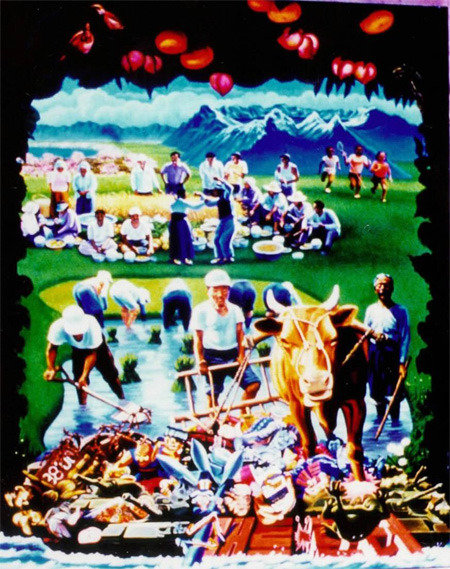Controversy over anti-state propaganda painting
Controversy over anti-state propaganda painting
Posted December. 30, 2017 07:47,
Updated December. 30, 2017 07:56

The Ministry of Justice has decided to transfer Shin Hak-chul’s painting “Rice Planting” to the National Museum of Contemporary Art for commission management. The painting has been confiscated after the Supreme Court ruled that the painting was spreading anti-state propaganda.
“Following a verdict to store the painting permanently in March 2001, the painting has been kept at the Seoul Central District Prosecutors’ office for 17 years. However, the painting has been damaged partly due to inappropriate storage location and methods, calling for proper treatment of the painting now,” said Justice Minister Park Sang-ki during his briefing on new year’s special pardon on Friday. Minister Park said that the United Nations Human Rights Council recommended a return of the painting to the Korean government in March 2004, and Shin and the Korean People’s Artists Association also consistently asked for a return of the painting. The government said the government hopes to satisfy the international community’s recommendation, the arts community’s request and the public’s interest and controversy in a reasonable way with the current decision as to how to deal with the painting. The Justice Ministry said that the painting will be transferred for commission management, not for a public display.
Shin painted “Rice Planting” in 1987. At the bottom of the painting, farmers are sweeping Coca-Cola and foreign cigarettes, which symbolize foreign influences, into sea and, at the top of the painting, farmers are celebrating a good harvest. Shin was indicted for violation of the national security law by the prosecution in 1989 with alleged motive for worship of North Korea. The Supreme Court sentenced Shin to 10 months in prison in 1999 and confiscated the painting.
The former Roh Moo-hyun administration also reviewed returning the painting to Shin or transferring to the National Museum of Contemporary Art. However, the court handed down a verdict that the painting cannot be transferred unless the precious verdict is nullified through a retrial.
After President Moon Jae-in took office this year, the Seoul Central District Prosecutors’ office reviewed a return of the painting under instructions by the Justice Ministry. However, the provisional conclusion by the prosecution was that the painting cannot be returned with the same reasons explained under the Roh administration.
The current decision by the Justice Ministry came as a compromise to avoid any legal controversy. “Transfer of the paining to a new location is to prevent any damage to the paining, which is permanently kept at the prosecution as a confiscated item,” said a source at the Seoul Central District Prosecutors’ office.
Hyung-Jun Hwang constant25@donga.com







